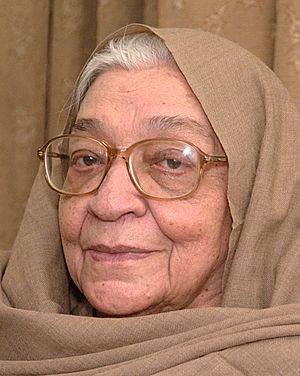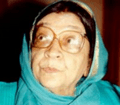Krishna Sobti facts for kids
Quick facts for kids
Krishna Sobti
|
|
|---|---|

Sobti in 2011
|
|
| Born | 18 February 1925 Village Jalalpur Sobtian, Gujrat, Punjab, British India |
| Died | 25 January 2019 (aged 93) New Delhi, India |
| Occupation | Fiction writer, essayist |
| Language | Hindi |
| Nationality | Indian |
| Alma mater | Fateh Chand College for Women, Lahore (did not graduate) |
| Years active | 1944–2018 |
| Notable works |
|
| Notable awards |
|
| Spouse | Shivnath |
Krishna Sobti (born 18 February 1925 – died 25 January 2019) was a famous Indian writer. She wrote many stories and essays in the Hindi language. She is known for her unique writing style and brave characters.
Sobti received several important awards for her work. In 1980, she won the Sahitya Akademi Award for her novel Zindaginama. Later, in 1996, she was given the Sahitya Akademi Fellowship, which is the highest honor from India's National Academy of Letters. In 2017, she received the Jnanpith Award, one of India's top literary awards, for her great contributions to Indian literature.
She also won other awards like the Katha Chudamani Award for Lifetime Literary Achievement in 1999. She sometimes wrote under the pen name Hashmat. Under this name, she published Hum Hashmat, a collection of short descriptions of other writers and friends. Many of her books have been translated into English and other languages.
Contents
About Krishna Sobti's Life
Krishna Sobti was born on 18 February 1925, in a village called Jalalpur Sobtian in Gujrat, which was then part of British India. This area is now in Pakistan. She grew up with three siblings, and her family worked for the British government.
She went to school in Delhi and Shimla. She started college at Fatehchand College in Lahore. However, she had to return to India when the country was divided in 1947. This event is known as the Partition of India.
After the Partition, she worked for two years as a teacher for a young prince in Rajasthan, India. Later in life, when she was over 70, she married Shivnath, who was also a writer. They were born on the same day of the same year! They lived together in Delhi. Shivnath passed away a few years later, and Krishna continued to live alone in their apartment.
Krishna Sobti passed away on 25 January 2019, in Delhi, after being ill for some time.
Krishna Sobti's Writing Style
Sobti was known for her special way of writing. She often mixed words and phrases from Punjabi, Urdu, and Rajasthani languages into her Hindi stories. This blend of cultures influenced her writing.
Critics praised her ability to use different dialects and languages. This made her characters and settings feel very real. However, this unique style also made her books difficult to translate into other languages. Her characters were often described as brave and ready to face challenges.
Her Fiction Stories
Krishna Sobti started her career by writing short stories. Her stories Lama and Nafisa were published in 1944. In the same year, she wrote a famous story about the Partition of India called Sikka Badal Gaya. She sent it to a well-known writer and editor, Sachchidananda Vatsyayan, who published it without any changes. This encouraged Sobti to become a professional writer.
Zindaginama: A Famous Novel
Sobti's first novel was called Channa. She sent it to a publisher in 1952. But when she saw the printed copies, she found that the publisher had changed her words. They had replaced her Punjabi and Urdu words with Sanskrit words.
Sobti was unhappy and stopped the printing. She even paid to have the printed copies destroyed. Later, a publisher named Sheela Sandhu convinced her to rewrite the book. It was finally published in 1979 as Zindaginama: Zinda Rukh.
This novel is about village life in Punjab in the early 1900s. It also talks about the political and social issues of that time. Zindaginama is considered a very important book in Hindi literature. In 1980, Sobti won the Sahitya Akademi Award for it.
After Zindaginama was republished, another writer, Amrita Pritam, published a book with a similar title. Sobti filed a lawsuit in 1984, saying Pritam had copied her title. The case lasted for 26 years and was decided in favor of Pritam in 2011, after Pritam had passed away. Sobti was disappointed because the lawsuit stopped her from writing Zindaginama as part of a three-book series.
Other Important Books
Sobti wrote several other popular novels. Dar Se Bichhadi (published in 1958) was set before the Partition of India. It told the story of a child born from a marriage between different religions and social groups.
Her novel Mitro Marjani became very famous. It was translated into English as To Hell with You, Mitro. This book helped Hindi novels explore new ideas beyond just showing real-life social problems.
Another novel, Surajmukhi Andhere Ke (published in 1972), was about a woman dealing with difficult childhood experiences. She also wrote two shorter novels in 1968, Yaaron Ke Yaar and Tin Pahar.
Ai Ladki is a more recent novel. It describes the relationship between an old woman who is dying and her daughter, who takes care of her. Sobti also wrote a book that was like a fictional story of her own life, called Gujrat Pakistan Se Gujarat Hindustan Taq (From Gujrat, Pakistan, to Gujarat, India). Her novel Dil-o-Danish was translated into English as The Heart Has Its Reasons and won an award.
Non-Fiction Writings
Starting in the 1960s, Sobti also wrote short profiles and articles using a male pen name, Hashmat. These were collected and published as Ham Hashmat in 1977. This book included profiles of other famous writers like Bhisham Sahni and Nirmal Verma.
Sobti explained that she used the name Hashmat because they had different ways of expressing themselves. She said, "I protect, and he reveals; I am ancient, he is new and fresh." Other writers praised her Hashmat columns, saying she wrote about fellow writers in a very warm and special way.
Main Works by Krishna Sobti
Here are some of her important books:
Novels
- Zindaginama
- Mitro Marjani
- Daar Se Bichchudi
- Surajmukhi Andhere Ke
- Yaaron Ke Yaar (Friend of Friends)
- Samay Sargam (Time's Musical Notes)
- Ai Ladaki
- Dil-o-Danish
- Badalon ke Ghere (Circles of Clouds)
- Gujarat Pakistan Se Gujarat Hindustan (From Gujarat in Pakistan to Gujarat in India)
- Hum Hashmat
- Tin Pahad
Short Stories
- Nafisa
- Sikka Badal gaya
Books Translated into English
- To hell with you Mitro! (Mitro Marjani)
- Memory's Daughter (Daar Se Bichchudi)
- Listen Girl (Ai Ladki)
- The Heart Has Its Reasons (Dil-O-Danish)
Awards and Recognitions
Krishna Sobti received many honors for her writing:
- Sahitya Akademi Award (1980) for Zindaginama.
- Sahitya Akademi Fellowship (1996), the highest honor from India's National Academy of Letters. The Akademi praised her for her five decades of creative writing.
- Jnanpith Award (2017) for her amazing contribution to Indian literature. The award committee noted how her language mixed Hindi, Urdu, and Punjabi cultures, and how her characters were always bold and daring.
In 2010, the Government of India offered her the Padma Bhushan, a high civilian award, but she politely declined it. She said that as a writer, she felt it was important to keep a distance from the government.
In 2015, she returned both her Sahitya Akademi Award and her Fellowship. She did this to protest against certain government actions and to show her concern for freedom of speech in the country.
She also received other awards, including the Shiromani Award (1981) and the Maithili Sharan Gupt Samman.
Images for kids
See also
 In Spanish: Krishna Sobti para niños
In Spanish: Krishna Sobti para niños
 | Aaron Henry |
 | T. R. M. Howard |
 | Jesse Jackson |


